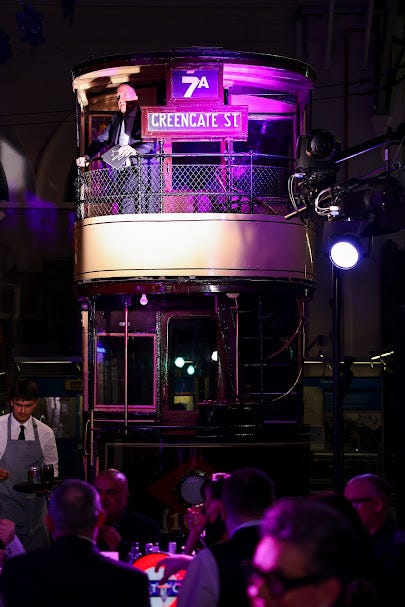THE London Transport Museum is based in the old Victorian flower market in a corner of the famous Covent Garden Piazza at the heart of the West End.
It seemed the perfect place to host the Stagecoach Excellence Awards, run by the bus company to celebrate the best of the best of its 23,000 employees.
Surrounded by London buses, trams, trains and taxis, the museum provides a wonderful setting for an awards ceremony.
I compered the evening and couldn’t help kicking things off from the top deck of a 1920s tram that used to pick up passengers in West Ham.
As I carefully clambered down the steps of the tram and made my way to the stage I could sense the buzz amongst the audience for the event, which was being held for the first time in four years due to a Covid-enforced absence.
The audience included the Stagecoach senior leadership team, non-executive directors, managing directors and the majority were employees from across the nationwide business who had been nominated for the awards.
The enthusiasm was infectious.
It was on display everywhere I looked, from a young man who had only been with the business for less than a year and was so excited to win his award he sat cuddling it for the rest of the evening.
To a lady who was first on the dance floor after the awards and last to leave it.
She was nominated for an award but didn’t win, but she told me she had had one of the best night’s of her life.
I asked her what her role was with Stagecoach.
“I’m a bus driver in Cambridgeshire. I’ve done it for 37 years and I wouldn’t want to do any other job,” she told me, before heading back to the dance floor.
Another lady I chatted to told me she lives in Cumbria.
“I have the best view in the world from my office window,” she said.
She then explained that she drives a sightseeing bus around the Lake District.
I’ve always believed everyone has a great story to tell.
At this event, which celebrated success, there were volumes of them.
BREAKING news…
According to the Yorkshire Post new figures released by YFM Equity Partners reveal that 41% of business owners in the region are planning to sell their companies in the future.
You what?
The venture capital firm surveyed Yorkshire business owners about their future intentions.
And YFM seems to think that the fact that 41% of them are thinking about selling their businesses in the future reflects a positive mood change following a sustained period of bad news with the pandemic, inflation and rising interest rates.
I don’t know about you but I’d expect that figure to be more like 99% of business owners are planning to sell their companies in the future.
In my experience those who start and run businesses always have an eye on an exit plan, usually one that can maximise the value of their business and give them a more than comfortable retirement.
Unless you plan to hand the business on within the family, the only other option is to sell it.
So my question to YFM would be, what have the 59% got in mind who say they aren’t planning to sell their businesses in the future?
A growing recent trend I’ve noticed is business owners selling their firms to staff via an Employee Ownership Trust.
The gushing press releases announcing such moves are gilded with the good intentions of the owner and the incredible opportunity it provides employees.
Great. But a shrewd corporate lawyer I know explained to me that the big benefit of selling your business to an EOT is that you avoid a lot of the tax you would pay if you just sold your business to a trade buyer.
And from what I have seen of firms sold to Employee Ownership Trusts they tend to fall into two camps.
They are either put into the hands of a dynamic, motivated management and staff team…or a basket case of a business is sold to a bunch of useful idiots.
PEGASUS World Holding, a textiles and fulfilment company based in Leeds, recently announced a 62% increase in turnover which it puts down to expanding its operational capacity and entering new markets.
The company's turnover rose from £8m to £13m in 2023 and chief executive Ivan Zhou expressed his satisfaction with the growth, attributing it to the hard work and commitment of the employees at the company, which is based on an industrial estate on Nursery Pit Lane in the Halton Moor area of Leeds.
He stated: "Our passion and aspiration have propelled us from a modest inception to a powerhouse of global influence, ceaselessly pursuing innovation.”
Crikey, it sounds like a line from a Hollywood blockbuster.
But there’s nothing wrong with a bit of ambition.
THOSE who travel to and from London by rail more frequently than me often recount stories of conversations they have overhead on the train.
Marketing, PR and digital agency teams rehearsing for a pitch meeting to a potential new client in London are a rich source of material.
When I was at the Yorkshire Post I once got a phone call from a business person who had been in a first class carriage from Leeds to London sitting behind the then Leeds United chairman Peter Ridsdale.
My informant listened to Ridsdale negotiate the details of Liverpool striker Robbie Fowler’s £12m move across the Pennines including how much his weekly wage would be and what bonus per goal he would be paid.
I was on a train from London to Leeds on Wednesday sitting in first class after securing a heavily discounted ticket in the recent Great British Rail Sale.
It was an amazing experience compared to my recent train travels - everyone got a seat and there was some edible food available.
As I settled back in my seat to gaze at the flooded fields which this winter have become a almost permanent feature in the English countryside, a loud voice boomed across the aisle.
“You know that manager we deal with at that broker? He’s a total wet wipe.”
It didn’t take long to work out that the two stout men sitting at the nearby table tapping their laptops and making regular phone calls were in the insurance business.
The younger one rang a colleague and requested a “Connie special” asking for a customer’s insurance on a new Ferrari to be turned around quickly “which, if you could do it, would be very amazing”.
You realise that Bob Mortimer’s “Train Guy” character - a loud commuter having cringe-worthy video calls at the top of his voice on a packed train - is not so much a spoof as an accurate reflection of this scourge on society.
I thought I’d heard all I needed to from the insurance bods across the aisle until a 35-minute delay to our train because of signalling problems ensured I picked up plenty more material.
“Do we insure commercial boats?” the younger chap asked his more senior colleague.
“I’m not sure, ask Bobby in marine,” he replied.
They then turned their attention to the client they were going to see in Yorkshire.
“What’s he like?” asked the older guy.
“In his world he is a big dog, not THE dog, but a big dog,” replied his colleague.
I munched on my LNER egg roll and miniature packet of crisps and stared out of the window where I saw a bedraggled horse standing in the middle of a flooded field.
Lucky thing.
Have a great weekend.





